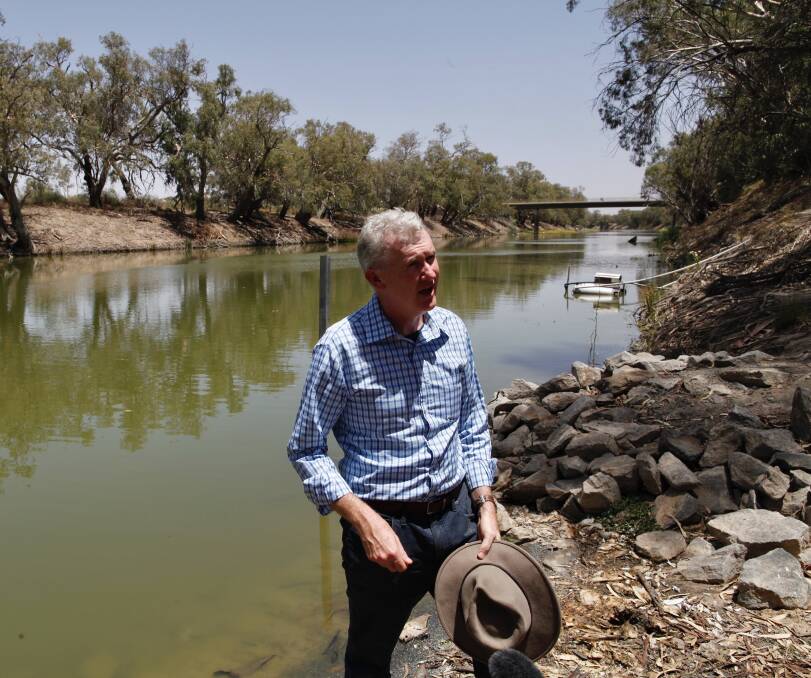
Labor is reigniting the divisive, emotionally-charged debate over Murray Darling Basin water recovery, setting the stage for a controversial election campaign.
Subscribe now for unlimited access to all our agricultural news
across the nation
or signup to continue reading
Opposition Water spokesman Tony Burke has committed to remove the 1500 gigalitre cap on voluntary water buybacks which he says will ensure the environment gets its fair share of water under the Basin Plan.
The government and farm representatives accused Labor of putting politics before river towns and warned that more buybacks would result in a significant downturn in many regional economies .
With support from the Greens, Labor will introduce a Bill a bill to the Senate tomorrow and if that fails, pursue the change if it forms government.
The buyback cap was made as an amendment to Basin Plan by the Abbott government in 2015.
Mr Burke conceded that communities would be nervous about more buybacks, but argued they may be needed if efforts to return water to the environment fall short.
“By removing the cap we are making clear that if we end up having to provide more water for the rivers then this will not be a barrier to being able to do that,” Mr Burke told ABC radio today.
“If you don't remove the cap on buyback what do you do if the (MDBA) does end up recommending more water needs to be returned to the rivers?
As reported here last week, the South Australian Royal Commission's findings on a particular aspect of the Basin Plan, namely the 37 water-saving supply measure projects, laid the platform for Labor to abolish the cap on buybacks.
Supply projects make up the 605 gigalitre bucket of so-called ‘downwater’ the states allow the states to swap water-saving projects for cuts to irrigation entitlement.
Project construction is set to commence soon. They are designed to deliver equivalent environment outcomes and include increasing the capacity of stretches in the river to deliver more water, changing operating rules, a drinking water pipeline to reduce Broken Hill’s reliance on Menindee Lakes, and new works to inundate floodplains more effectively.
South Australian Senator Anne Ruston told the Senate today that Labor’s move was a political move to secure city votes.
“It’s using communities as pawns in a political game,” Ms Ruston said.
“To debate the cap when you haven’t reached the cap is hypocritical. It’s politics not good policy.”
The Commonwealth has completed 1230GL of voluntary buybacks, with 270GL still available under the 1500GL cap.
“(Removing the cap) doesn’t take into consideration the communities that depend on the river and the irrigation from the river. It will have a massively devastating effect,” Ms Ruston said.
Senators who supported more buybacks should be prepared to nominate the towns to be impacted, she said.
“Renmark has just recovered from the massive amount of buybacks that have come out of my community.”
National Irrigator’s Council chief executive Steve Whan said the Royal Commission had ignored the evidence that buybacks are linked to job losses.
“That serious negative socio-economic impact has been confirmed by detailed, peer reviewed, scientific studies that have looked at individual community impacts,” Mr Whan said.
“Probably the most offensive aspect of the recent SA Royal Commission findings was the Commissioner’s arrogant dismissal of socio-economic impacts. It’s very easy for wealthy Sydney lawyers to dismiss the impact on people who live in regional communities, but it isn’t something we expect to see from Labor.”
Mr Whan said the states are responsible for the supply projects, but Labor’s move politicises the issue and makes communities liable for the outcome.
“Those supply projects are proceeding very slowly, but that is not the communities’ fault. Labor’s commitment should be to speed up the wheels of Government on these projects, not push the blame, and the cost, on to people who have no control, he said.
“We need to be very clear that we will not get the Basin Plan implemented and therefore we will not get further environmental improvement, if the Plan goes back to having battlelines drawn. Labor needs to remember its responsibility to the long term not just focus on today’s headlines.”
Projects proposals by the states have been approved by the MDBA, but scant detail has been released publicly.
The deadline for construction to begin is July. The MDBA will assess the supply projects in 2024 and if they fall short the law requires the shortfall is made up.
Royal Commissioner Bret Walker ‘s findings claimed the Murray Darling Basin Authority oversaw process that fudged the science to deliver a politically palatable outcome that risked shortchanging the environment of water.
“The habitual behaviour of the MDBA, and to a lesser but alarming extent the CSIRO, is marked by an unfathomable predilection for secrecy,” Mr Walker said.
Backing up the Royal Commission's findings, the Productivity Commission’s five year review of the Basin Plan found the lack of detail poses “significant risks” that the projects won’t actually save water.


